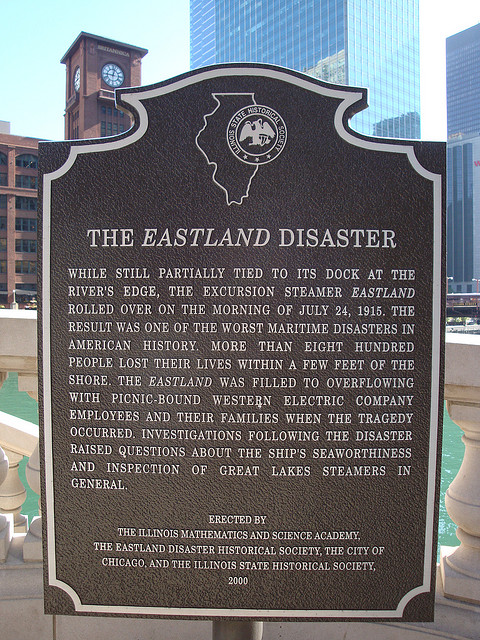The Eastland Disaster: The Musical!
By Jonathan Abarbanel

The Eastland Disaster: The Musical!
By Jonathan Abarbanel
Universally, the world still was reacting to the sinking of the Titanic just three years earlier. Parallels were drawn both then and now between the two maritime disasters, but they have few similarities beyond the tremendous loss of life. The Titanic was a 900 foot luxury vessel lost in a vast ocean on its maiden voyage, while the Eastland was a 265-foot lake steamer with a decade of service, docked in a modest river.
But the biggest differences are the great and ironic hubris attached to the Titanic, declared unsinkable, and the class struggle represented by the wealth and fame of its First Class passengers vs. the nameless immigrants in steerage. The Eastland had no such hubris, especially on that July day when the vast majority of its passengers were working-class employees of the enormous Western Electric works (manufacturers of all Bell Telephone equipment) and their families, on an annual company-paid holiday. The Titanic was glamorous, the Eastland was not.
It’s easy to create a dramatic work about the Titanic with its inherent themes of mankind vs. nature or god, rich vs. poor and the choices made by passengers and crew — noble or not — in the three hours it took the ship to sink. For decades, too, there was the unreachable and unknowable wreck lying 12,000 feet under the sea. There have been at least four major motion pictures about the Titanic, scores of books, several plays and a Tony Award-winning Broadway musical.
The Eastland Disaster commands none of that, as it was instantaneous and absurd, providing no time for personal drama or choices, and offering no inherent themes other than, “Why, God, why?” for the theologically inclined. People died because they arrived early and went below to escape the chill morning air. People lived because, like football great George Halas, they arrived late and were caught in traffic on LaSalle Street. The ship wasn’t even lost: within weeks it was righted, refurbished and renamed (the Wilmette) and saw another 30 years of service as a training vessel at the Great Lakes Naval Base. There are a couple of books about the Eastland, a Chicago-based Eastland Disaster memorial society and now — 97 years after the event — a musical, created by the Lookingglass Theatre.
So, what kind of musical do you make out of the Eastland Disaster? The answer, for author Andrew White and composers Andre Pluess and Ben Sussman, is a blue-collar musical; a show as unglamorous and modest and accessible as the folks who boarded and died on her.
What does that mean? For starters, don’t expect a Broadway-style show with production numbers and big solo songs; they’re not here. Also, don’t look for a lot of precise details of the what, when, where and why variety. If you want to know that the Eastland was docked at Clark Street, or was one of three steamers going out that day with Western Electric employees, or was known as the Speed Queen of the Great Lakes, you’ll have to Google the “Eastland Disaster” for such things are not the concern of Eastland, the world premiere musical.
Indeed, with the exception of Mara Blumenfeld’s costumes in full shirtwaist/Gibson Girl mode, there’s nothing about the physical production that says “1915.” The same holds true for the score by Andre Pluess and Ben Sussman, which is broadly folkloric and Appalachian in flavor. Most of the show is underscored by acoustic string instruments and piano, and the tunes don’t stop to allow for applause. The contrapuntal and chorale writing is quite amazing in the few numbers (not specifically named in the program) where it reaches full flower, such as the chorus “Only the river remains.”
The result — and clearly the intent — is an ethereal work which frequently is moving and haunting but rarely exciting. You may leave with musical impressions but you won’t hum a tune. You certainly will remember the poor boy whose body lay unclaimed for weeks, or “the human frog” who held his breath like Houdini to dive again and again for the quick and the dead, but you won’t leave with much understanding of the event itself. Lacking the obvious themes of the Titanic catastrophe, there is little to understand beyond the frequently-arbitrary and unfair falling out of life.
Author White instead wants Eastland to reflect the connections of the blue-collar, immigrant communities of which most Western Electric employees were members. His focus is on a few real people, a few fictional ones, and the patterns of love, loss, longing and family which the disaster interrupted. In director Amanda Dehnert’s effectively shadowy staging, people float before you and drift in and out of Christine A. Binder’s pools of light, sometimes suspended in air (as if in water), with dripping-wet clothing hauled out of iron washtubs to represent the dead, and with the audience seated in church pews within a Chautauqua tent.
Eastland wishes to be an elegy and not an exclamation point, an ache rather than a terrible wound, and at this it is highly successful. It continues at Lookingglass Theatre in the Water Tower Pumping Station through July 29.